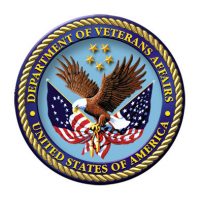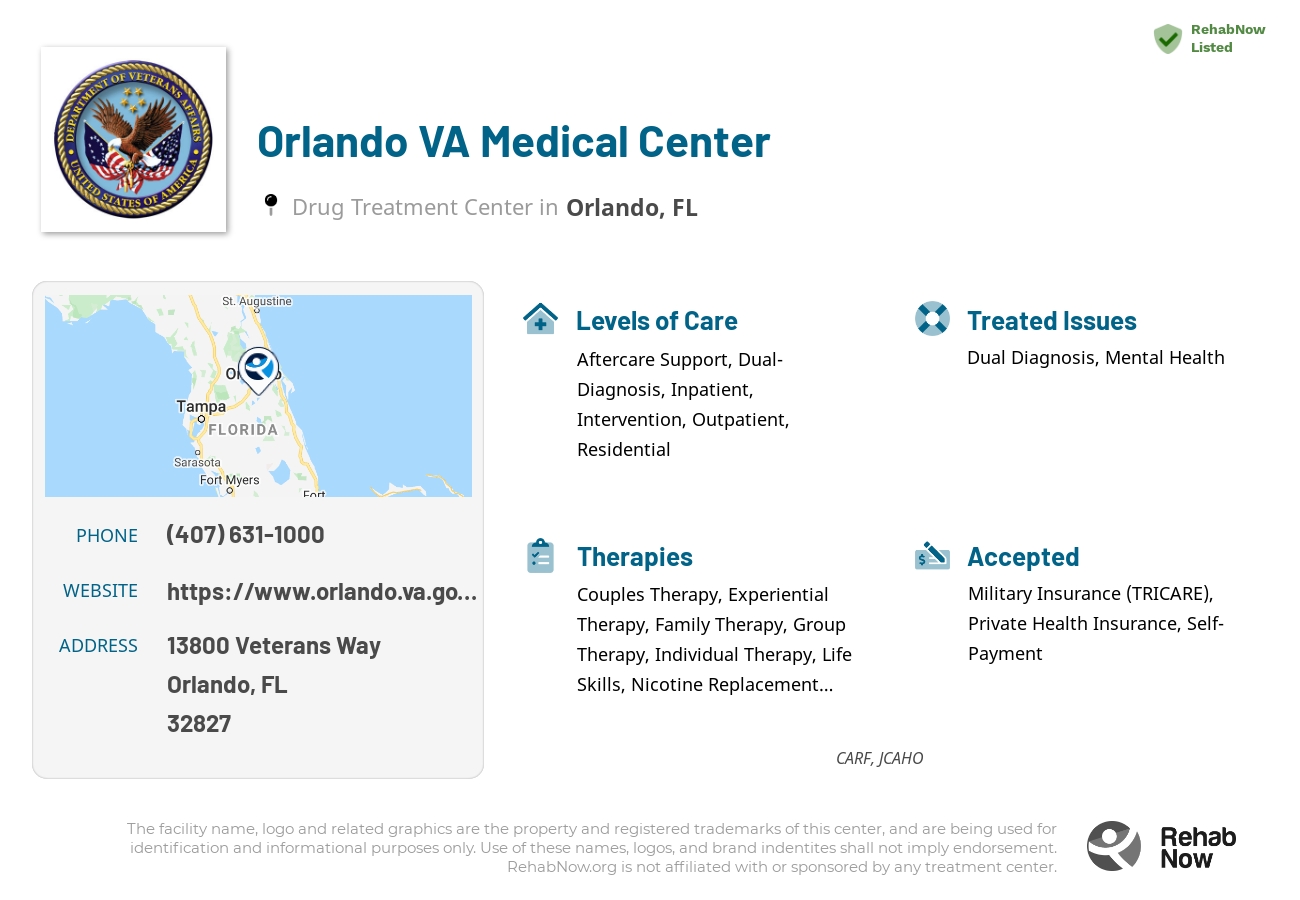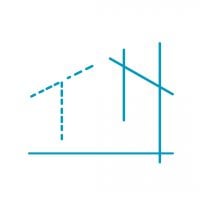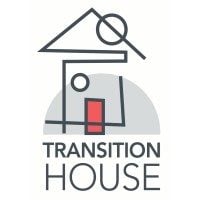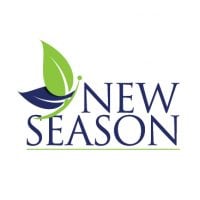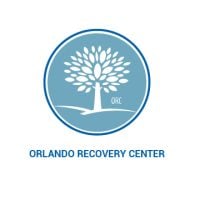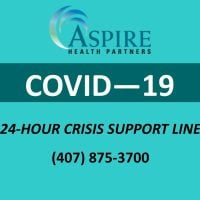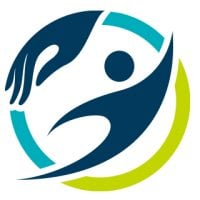About Orlando VA Medical Center in Florida
Orlando VA Medical Center is a licensed and accredited Dual Diagnosis (Co-Occuring Disorders), Mental Health and Drug Treatment Facility in Orlando, FL that offers a variety of methods methods and programs for Dual Diagnosis (Co-Occuring Disorders), Mental Health, and Drug Addiction. and other related Drug Addiction issues. Addiction is hard to beat, that’s why Orlando VA Medical Center offers a variety of levels of care that can help addicts recover from their addictions and live a healthy, happy life again. The staff members are trained professionals who will do everything they can to help you find the right level of care for your needs.
Addiction is a disease that affects a person's entire life, and can be treated. Orlando VA Medical Center understands how hard it is to get sober, but are here to help. Their rehab center has a variety of treatment methods that with the goal to help addicts get clean and stay sober for good. This facility does not decline any gender. Treatment here is offered to all genders, and notably supports LGBTQ+.
When weighing your treatment options, accredited and licensed facilities are generally suggested more often. Orlando VA Medical Center is CARF Accredited. JCAHO has Accredited this facility. Payment methods here are Military Insurance (TRICARE), Private Health Insurance, Self-Payment and potentially more case-based methods are available. Since Orlando VA Medical Center accepts health insurance, get help from our experts to find a facility that accepts your plan.
Genders
Ages
Modality
Additional
Accreditations

JCAHO

CARF
The Commission on Accreditation of Rehabilitation Facilities (CARF) is a non-profit organization that specifically accredits rehab organizations. Founded in 1966, CARF's, mission is to help service providers like rehab facilities maintain high standards of care.
Conditions and Issues Treated
When someone in struggles with both addiction and mental or emotional illness, this is considered a dual diagnosis. Dual diagnosis treatment can include therapy for these issues to happen simultaneously, which will allow either of them to be treated effectively.
Sometimes people who have suffered from addiction disorder also suffer from co-occurring disorders such as depression, anxiety, bipolar disorder, etc., making them “dual diagnoses.” Dual diagnoses require specialized treatment programs where drug and alcohol addiction are addressed along with psychiatric illnesses. Some rehabilitation facilities provide patients suffering from cooccurrences a program with highly integrated services and a clean environment with few distractions to help them succeed.
Levels of Care Offered
This center offers a variety of custom treatment tailored to individual recovery. Currently available are Aftercare Support, Dual-Diagnosis, Inpatient, Intervention, Outpatient, Residential, with additional therapies available as listed below.
Inpatient treatment for alcoholism or drug addiction is an option that provides the addict with a supportive environment in which they can stop using. After detox, an inpatient treatment center provides a structured environment for the addict to recover from their addiction and begin taking steps toward a lifetime of sobriety.
This type of treatment is appropriate for addicts that are most in need of intensive care and supervision. This includes those who were unable to quit on their own, those who need more structure than they can get in outpatient treatment, and those whose addiction has led them into legal trouble or severe health problems.
Outpatient treatment is often used for drug addicts in drug rehab. Outpatient treatment consists of counseling and therapy sessions. This form of treatment is also called ‘day-treatment’. The outpatient treatment process begins with the addict’s initial detox period, lasting about ten days.
Outpatient treatment is used for those who are at moderate risk for ‘slipping back’ into the addiction, for those who:
- Are not currently experiencing any side effects from withdrawal and can handle social pressure
- Can handle stressors that might trigger relapse
- Have a stable living environment or have moved out of their previous environment, which was not conducive to being sober
- Have a support system that allows them to go to a facility a few times a week while still keeping their current responsibilities
- Have no legal obligations, being either on parole or probation, that require them to seek treatment at a mandatory facility
- Are not currently experiencing any side effects from withdrawal and can handle social pressure
- Have a stable living environment or have moved out of their previous environment, which was not conducive to being sober
Residential treatment programs are those that offer housing and meals in addition to substance abuse treatment. Rehab facilities that offer residential treatment allow patients to focus solely on recovery, in an environment totally separate from their lives. Some rehab centers specialize in short-term residential treatment (a few days to a week or two), while others solely provide treatment on a long-term basis (several weeks to months). Some offer both, and tailor treatment to the patient’s individual requirements.
Intervention Programs can be beneficial for those who are not prepared to engage in a recovery program. The individual’s friends and family will call and set up an intervention in or near Orlando, and at which a specialist will come and lead the discussion. Interventions help family members motivate those affected to seek external support.
People involved in substance abuse usually deny the harmful effects of their changed behavior. They believe they can overcome addiction alone. This, however, can be difficult without external help. Intervention services deploy professionals to help organize meetings between individuals and family members. Family members converse openly with the affected individual and express concern for them. They explain different treatment options and persuade the individual to act immediately.
Completing a drug or alcohol rehab program is only the first step. Then comes aftercare support. These services include sober living accommodations, career counseling, and AA/NA programs for those struggling with sobriety or who want help maintaining it after initial rehab at an addiction facility.
They can last up to a year or more depending on what’s needed most urgently after the earlier stages are completed.
Therapies & Programs
Because no single treatment is effective for all addicts, the goal of treatment and therapy should be to figure out what works best for each individual. Tolerance and withdrawal levels differ from person to person, affecting the treatment intensity required. Addiction treatment should aim to help addicts develop healthy coping mechanisms for dealing with their addiction and its underlying causes.
Couples therapy works with clients and significant others in a professional capacity to improve relationship dynamics. This can be helpful for addicts who are trying to marry the idea of recovery into their work, family, social lives – any aspect that has to do with relationships. Through counseling sessions, addicts will have an opportunity to talk about their addiction with professional partners.
Family therapy is beneficial for people who are in addiction treatment services because it offers addicts the opportunity to work with their family members to better understand what led them to make choices that contributed to their addiction.
This type of therapy helps family members reach a deeper understanding of how they can best support their loved one during recovery. It also helps the addict better understand their own motivations and triggers that led them to turn to substance abuse.
Family therapy can help addicts in the following ways:
- Assists family members in processing difficult feelings so they don’t blame or resent recovering addicts
- Assists family members in understanding how addiction has impacted the addict and everyone who is involved with them
- Allows the addict to take responsibility for their actions, while encouraging improved communication skills
- Helps family members understand how to best support an individual in recovery so addicts don’t relapse again.
Group therapy can help build a stronger support system and give addicts in Orlando, FL insight into their addiction that they gain through shared conversations. Group therapy occurs in a controlled group environment, exclusive of one on one meetings. This makes it safer for patients to feel comfortable sharing the struggles they’re going through and gaining perspective.
Trauma therapy is beneficial for people who are recovering from drug addiction because it helps them heal from past traumas that may have caused them to turn to harmful substances or led them to experience negative emotions that contributed to their destructive behaviors.
This type of treatment works by processing difficult experiences so individuals can learn how to process these events without having to turn to substances for coping.
Trauma therapy can help addicts in the following ways:
- Helps individuals understand their experiences and emotional responses to difficult events, including why they turned to drugs or alcohol
- Provides them with comfort and support while working through difficult emotions related to these traumatic experiences
- Offers an opportunity for addicts to have a voice and be heard, which can improve their self-esteem
- Can help them develop coping skills so they can better respond to triggers instead of turning to substance abuse.
Cognitive-behavioral therapy is a technique that is used to help people with addiction. Specifically, it is a way of identifying thoughts and behaviors that cause the addiction. It is typically used in an individual counseling session.
The content explains cognitive behavioral therapy and how it works to address some behaviors that may be leading to unintended consequences in their life, as well as its benefits for those seeking sobriety.
It works by helping people to talk through their issues and addressing the thoughts that cause said behaviors. It is an excellent way of learning about oneself and one’s perception of the world.
Life Skills Services assist addicts in their recovery by teaching them healthy coping mechanisms that will aid them in becoming sober, focussing on helping people enter into, and maintaining long-term sobriety. Drug Treatment Centers provide Life Skills Services at varying levels of intensity, specific to the needs and requirements of each patient.
The benefits of Life Skills Services offered at Orlando VA Medical Center:
- Restores hope and empowerment — Helps addicts believe that recovery is possible and instills a new confidence in their ability to achieve a positive, drug-free future
- Enhances family involvement — Encourages families to get involved in the recovery process and supports their understanding and encouragement of healthy behavior.
- Increases patient’s compliance — Helps patients take responsibility for and ownership of their recovery and encourages continued progress
- Reduces relapse rates — Encourages long-term abstinence and emphasizes the importance of establishing sober support systems.
It’s important to remember that malnutrition can affect your mood and energy level, which affects your desire to get sober. Good nutrition helps keep your body strong against the familiar ravages of drug use–tuberculosis, hepatitis, abscesses, infections, etc. — as well as the physical symptoms of withdrawal. If you’re eating right, you’ll have more energy for productive activities and will have more strength to fight cravings.
Nicotine Replacement Therapy (NRT) has many benefits for drug addicts who also choose to quit smoking. It is an effective technique at this treatment center that provides smokers with the nicotine they are addicted to without inhaling carcinogens from cigarettes to wean them off entirely. You can reduce your risk of heart disease and cancer, irritability, bone loss, stroke, type II diabetes, fertility in women, an enhanced sense of taste and smell.
Patient Experience
Experiential Therapy at Orlando VA Medical Center
Experiential therapy uses engaging activities to help patients access deeper, often hidden emotions. For example, the patient could role-play a problematic situation or engage in activities like drawing, painting, poetry writing, music composition, exercising, or journaling to help process intense feelings.
Experiential therapy is a type of therapeutic approach that focuses on having patients work through problems, issues, or emotions by engaging directly in some real experience. Experiential therapy occurs face-to-face with a therapist who helps these people to explore their feelings first hand.
It is based on the belief that to truly understand and gain insight into oneself and behavior; it is necessary and helpful to have real experiences with the issues involved. Some therapists have developed the experiential therapy approach as a way of treating addictive behaviors or dealing with impulses related to addiction. It comes from an existential school of psychotherapy called ‘experiential existential.’
Payment Options Accepted
For specific insurance or payment methods please contact us.
Is your insurance accepted?
Ask an expert, call (888) 674-0062
Additional Details
Specifics, location, and helpful extra information.
Orlando, Florida 32827 Phone Number(407) 631-1000 Meta DetailsUpdated November 25, 2023
Staff Verified
Orlando VA Medical Center Patient Reviews
There are no reviews yet. Be the first one to write one.
Orlando, Florida Addiction Information
Florida is one of the nation's epicenters for substance abuse and drug-related overdoses. In 2014, around 410,000 Florida residents were addicted to drugs and alcohol. Over the last 10 years, 12% of all deaths in the state were attributed to substance abuse. Treatment admissions for alcohol reached 24,329 patients in 2016, and 2.5% of Florida high school students admitted to using crack cocaine.
In 2016, there were over 1,400 opioid-related overdoses in Florida, and Orlando accounted for nearly 10% of those overdoses. Cocaine was the most common drug found in overdose victims (45%). Alcohol was involved in 31% of all drug-related deaths. If you or someone you know is struggling with addiction, it is important to get help as soon as possible.
Treatment in Nearby Cities
- Jupiter, FL (122.6 mi.)
- Davie, FL (170.3 mi.)
- Yulee, FL (158.0 mi.)
- Avon Park, FL (55.1 mi.)
- Mulberry, FL (53.6 mi.)
Centers near Orlando VA Medical Center
The facility name, logo and brand are the property and registered trademarks of Orlando VA Medical Center, and are being used for identification and informational purposes only. Use of these names, logos and brands shall not imply endorsement. RehabNow.org is not affiliated with or sponsored by Orlando VA Medical Center.
